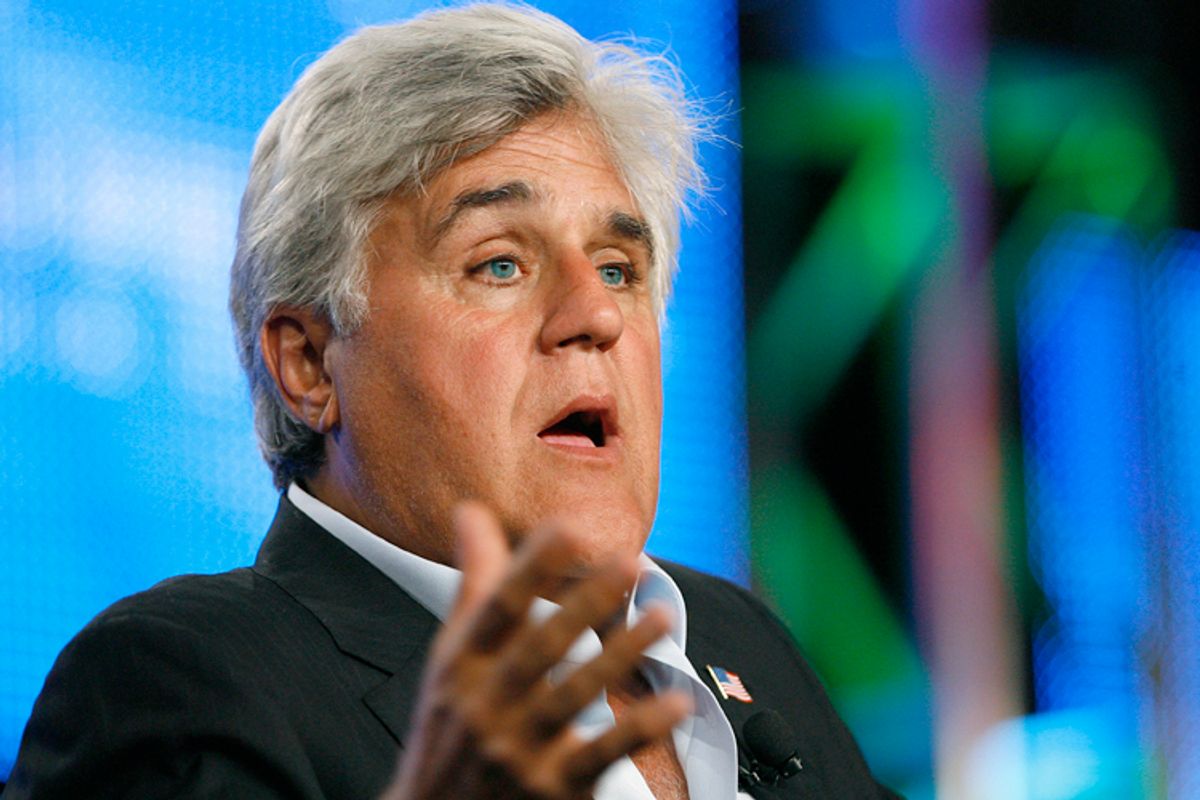Jay Leno is by far the most successful late-night broadcaster in the game -- so much so that, even after his retirement as host of NBC's "Tonight Show" tonight, his future remains very much an object of speculation, with the New York Times printing a rumor that the host may end up on CNN in its coverage of his NBC farewell.
Leno is a person to whom interesting things have consistently happened: He beat out David Letterman, an NBC employee already, to take Johnny Carson's seat on "Tonight"; he ended up in a decades-long feud with Letterman when the gap-toothed comic moved to CBS; he found his way back to "Tonight" after NBC gave the chair to Conan O'Brien.
Letterman and O'Brien both have very particular styles that ensured they'd have passionate fanbases: Letterman's dour irony, O'Brien's absurdism and looseness. Leno's style, such as it was, was to be no one's absolute favorite comic but broad enough that no one would ever not get the joke.
Throughout the late 2000s and early 2010s (leaving aside the 2009-10 O'Brien interruption), Leno's "Tonight" was the only comedy program on NBC that was actually a hit. "30 Rock," "Parks and Recreation," "Community" were critically revered, but all survived thanks to that critical reverence (and the fact that there simply weren't any better ideas for what to put in the timeslots). Leno may have been an object of derision both for his perceived role in keeping Letterman and, later, O'Brien away from the "Tonight" franchise.
But what, indeed, is the franchise? Leno may well have been the perfect one for the most revered gig in comedy.
Rhyming with NBC's equally broad "Today," "Tonight" has never exactly been groundbreaking; Johnny Carson was very good at landing jokes but was no more an experimental comic than "Today" is an investigative journalism show. It's an entertainment program meant to soothe, not to provoke -- genial celebrity interviews, light topical humor that jibes the people in power without getting too upsetting
What "Tonight" bits, ever, have entered the lexicon? Carnac, maybe, and the animal bits -- but largely it dissolves into a nice warm vanilla pudding in memory. It's explicitly meant to usher all of America to sleep. Jokes about, in their eras, Lance Ito and Bill Clinton weren't provocative, but they were accessible to anyone, regardless of political orientation or degree to which one follows the news. With the "Jay Walking" bit, Leno made a joke out of the degree to which people didn't know the news, allowing viewers to feel both well-informed and one with a great mixed-up nation. All of us don't know some things! The segment wasn't revolutionary; it chucked its viewer under the chin for being clever enough.
And that's great -- necessary, even. For all that broadcasting to a wide, general audience has fallen off a cliff in the era of cable and streaming, there are some institutions whose power is derived from their generality. Jay Leno is boring, sure -- but if he weren't, what would people who aren't into edginess in their comedy watch? Leno is palatable to those who don't want to be hectored by Letterman or occasionally confounded by O'Brien.
And new "Tonight" host Jimmy Fallon, for all the younger comic has experimented with musical bits, shares far more of Leno's DNA than do the other men. He, too, wants to please a mass audience more than he wants to prove anything, and his bits -- while creative -- aren't challenging. They rely on familiarity with hit songs and popular celebrities. People can resent Leno for hosting "Tonight" instead of their preferred comic. But he's the only one whose lack of edge fit the format; an O'Brien "Tonight" would have ended up as relevant as his current TBS program (if slightly higher-rated). It'd have been a show for O'Brien fans. That there aren't really Leno die-hards, but people who found "Tonight" enjoyable to watch, was the best thing for the sort of franchise of which there are very few left.



Shares